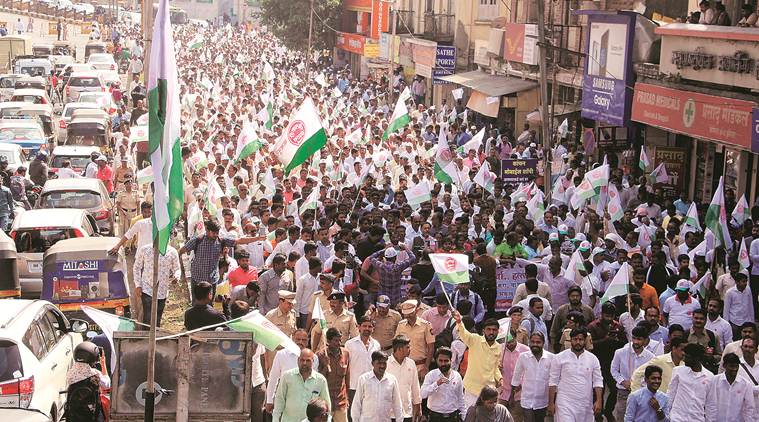
On February 11, a group of cane farmers decided to camp outside the Jawahar Shetkari Cooperative Sugar Factory in Kolhapur district’s Hatkanangale taluka. This mill, like many others in southern Maharashtra, had paid farmers only Rs 2,300 per tonne for cane supplied by them during the current crushing season, as against the government’s Fair and Remunerative Price (FRP) of Rs 2,903.24.
“Some of us started cooking outside the gate, while others locked up the officers and directors who were inside the mill. We were clear — nobody would move out, nor be allowed to, until the management paid us the full FRP,” says Sagar Sambhushete, a four-acre sugarcane grower from Nandani village in Shirol taluka and also president of the farmer organisation Swabhimani Shetkari Sanghatana’s (SSS) youth wing.
The agitation, which started at 1 PM, ended by 8 PM the same day, as the factory — whose Chairman Prakash Kallappa Awade is also Kolhapur district president of the Congress and a former Maharashtra minister — agreed to pay the FRP, which varies from mill to mill and is linked to average sugar recovery from cane.
For Awade, the spectacle of farmers cooking and camping outside the mill gate was as much a reason for making full payment, as the prospect of attachment of property by the Sugar Commissioner to ensure recovery. But there was a consideration: Kallappa Baburao Awade, the founder of Jawahar cooperative and the present chairman’s father, was also the Congress’s candidate from the Hatkanangale Lok Sabha constituency in 2014. He had lost that election to Raju Shetti, who heads the SSS.
“We have compelled eight other mills in the Kolhapur-Sangli belt to pay up. The plan is to hold similar protests in the remaining mills as well later this week (the two districts are home to 37 out of Maharashtra’s 190 factories that have taken up crushing in the current season,” says Sambhushete.
There is some basis to his claim.
Maharashtra mills were supposed to have made FRP payments of Rs 10,487.34 crore to sugarcane growers net of harvesting and transport charges for the 2018-19 season from October till January 15. As against this, actual payments amounted to only Rs 5,166.99 crore, translating into arrears of Rs 5,320.35 crore or 50.7 %.
But one month later, that picture has somewhat changed. According to provisional data made available to The Indian Express, the total FRP payments due till February 15 was Rs 15,605 crore. Out of that, mills have so far paid up Rs 11,082 crore, which leaves arrears of Rs 4,523 crore or under 29 per cent. The Sugar Commissioner Shekhar Gaikwad is hopeful that the cane dues would fall below 10 per cent by March-end, when most factories would have stopped crushing. And by then, it’s time for the next Lok Sabha elections as well.
While non-payment of cane price can be a potent issue before polls, in the case of Maharashtra, though, it can hurt the Opposition quite as much as the ruling BJP-Shiv Sena coalition. The reason is that most of the sugar factories in the state — whether cooperative or private — are managed/owned by politicians associated with the Congress or the Nationalist Congress Party.
Awade’s factory isn’t the only one that has buckled under farmer pressure. The Vishwasrao Naik Cooperative Sugar Factory at Sangli’s Shirala taluka (its chairman Mansingrao Fattesingrao Naik is NCP politician) and the Shree Datta cooperative mill at Shirol in Kolhapur (headed by Ganapatrao Appasaheb Patil of the Congress) have also cleared their FRP dues within the last 10 days.
Ironically, Shetti — who has been spearheading the cane growers’ agitation — had, until recently, given indications of joining the Congress-NCP alliance in the forthcoming national polls. In the 2014 elections, he was part of the BJP-Shiv Sena front, cornering 53.8 per cent of the votes in the Hatkanangale constituency. Another leader from his organisation Sadabhau Khot — who has since parted ways and become a minister in the current BJP-Shiv Sena government — fought against the NCP leader and ex-Deputy Chief Minister Vijaysinh Shankarrao Mohite-Patil in Madha constituency. He lost that seat, which the NCP president and Maratha strongman Sharad Pawar is now expected to contest, by 25,344 votes.
Since the start of the current agitations, Shetti has distanced himself from the main Opposition front, though both the Congress and the NCP are still hopeful of getting him by their side. “When mills are largely controlled by their politicians, it is not easy for someone who has won twice from Hatkanangale (in 2009, Shetti defeated NCP’s Nivedita Mane) on the strength of mobilising cane farmers to associate with the Congress-NCP. Payment of FRP becomes non-negotiable under these circumstances,” points out a political observer.
According to millers, the Centre’s decision on February 14 to hike the minimum ex-factory sale price of sugar from Rs 29 to Rs 31 per kg should help factories pay the full FRP in the coming weeks. The Malegaon cooperative sugar mill in Pune district’s Baramati taluka has paid only Rs 2,215 per tonne to its growers. “The increased valuation of sugar will now allow us to borrow more from banks and pay the full FRP of Rs 2,775,” said Ranjankumar Shankarrao Taware, the chairman of the factory.